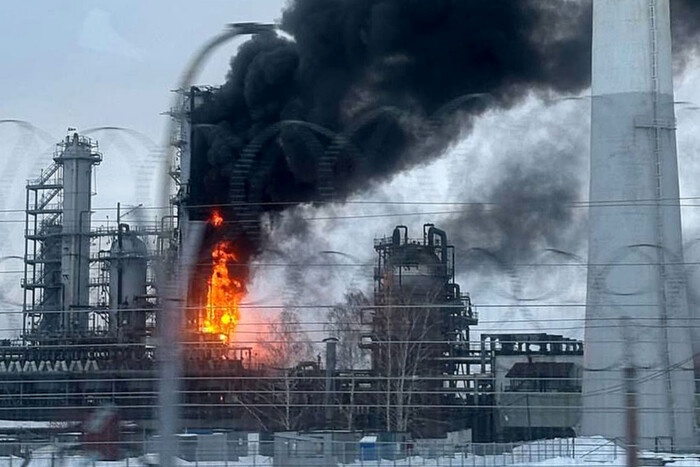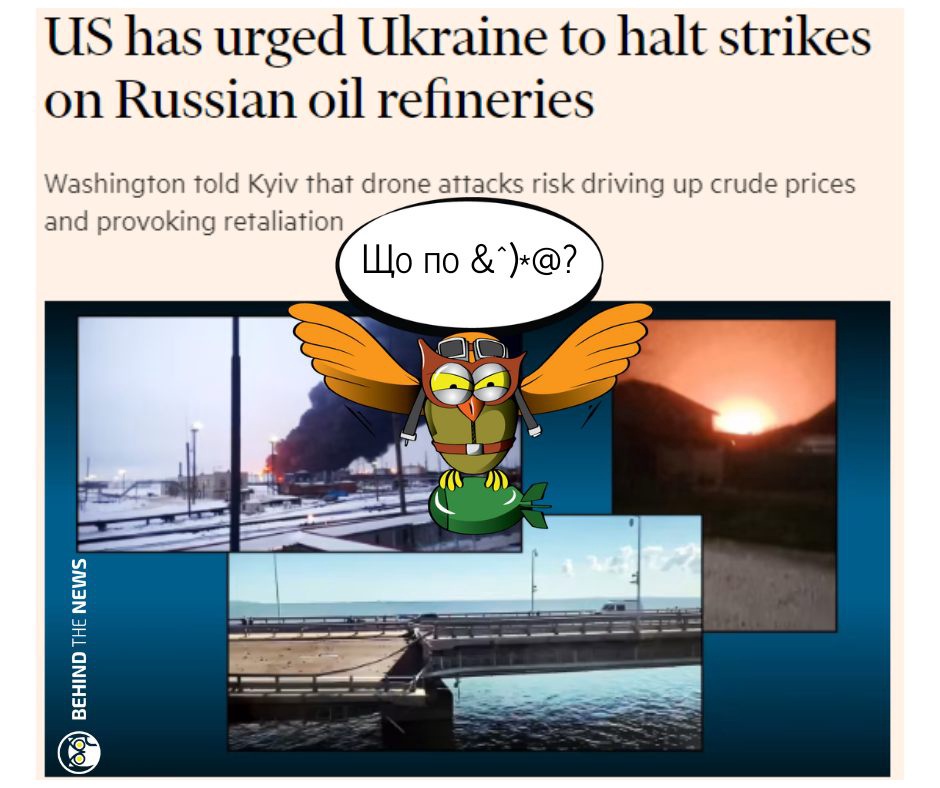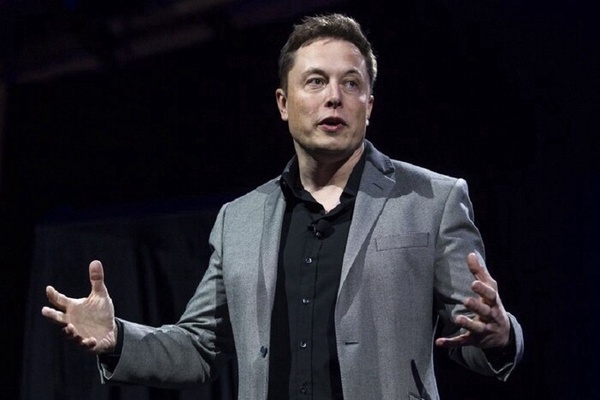Financial Times article on "US call for an end to Ukrainian attacks on Russian oil facilities"

For us, the outrage began, of course, with a story about Washington’s alleged call to Ukraine to stop strikes on the territory of the aggressor state, as this risks raising global oil prices and provoking retaliation.

The topic of Ukrainian attacks on russian oil facilities may have just erupted in the Ukrainian information space today, but the Financial Times has been working on it for more than a week. And, apparently, from their perspective, this news does fit into the general narrative. What do we mean by that? Christopher Miller, the newspaper’s Ukraine correspondent on the ground in Kyiv with his finger on the pulse, has published three news stories, a podcast, and several other seemingly unrelated publications in this timeframe.
The news that excited us all didn’t mention the mysterious visit of Jake Sullivan, the US National Security Advisor. However, the authors of Yevropeiska Pravda, Serhiy Sydorenko and Yuriy Panchenko, suggest that this ephemeral “US call” came from him during a conversation with Volodymyr Zelenskyy, though there is no official confirmation of this information. The meeting’s participants, including the President himself, limited themselves to general comments about the “content” of the meeting.
A few hours later, the story was updated with a comment by Deputy Prime Minister for European and Euro-Atlantic Integration Olha Stefanishyna at the Kyiv Security Forum:
“We understand the calls of our American partners and at the same time we’re struggling with the capabilities, resources and practices we have today.”
In the evening, Mykhailo Podoliak, an adviser to the head of the Presidential Office, commented to the russian TV channel dozhd that the news of such US calls was fictitious information. And he managed to completely confuse ordinary content users, didn’t he?
So, should we believe the Financial Times?
In general, the news outlet cites three independent anonymous sources who say that the warning from Washington was repeatedly passed on to senior officials of the SBU and the GUR.
But what’s interesting is that the news outlet mentions “the infrastructure on which the West relies”. And it is attacks on this infrastructure that the United States allegedly fears. In other words, russia, upset by the attacks on its oil refineries, may try to get, for example, the pipeline that transports oil from Kazakhstan through russia to the world market. There was already a precedent for the closure of this pipeline in 2022. It’s used by Western companies, including ExxonMobil and Chevron, the Financial Times writes.
However, why are the appeals mentioned by the Financial Times only about oil refineries? Why is there no mention of oil pipelines or oil production facilities?
Notably, the news about the alleged US call was free to access and view, while we’ll have to pay for the details of today’s russian attack on Ukrainian infrastructure.
So, finally, let’s talk about accents and emphasis. How exactly has the Financial Times been talking about Ukrainian attacks on russian territory all these days before the alleged US statement? To summarize: with some concern.
In the FT News Briefing podcast of March 14, Christopher Miller said that such attacks — “hundreds of miles from the Ukrainian border” - are aimed at “depriving the enemy of resources and reducing the flow of oil money and fuel”.
According to the russian ministry of energy, there are 38 working oil refineries in Russia, 88 in total. In his commentary to Suspilne, energy expert Gennady Ryabtsev points not only to the economic consequences of drone attacks, but also to the military ones: they certainly affect the supply of fuel for the russian army.https://bit.ly/3Vv0KR8
The article also summarizes the consequences for the russian oil refining industry as of March 16. It’s interesting to note that over the past week, “refineries accounting for 12% of russia’s oil refining capacity were damaged”. However, Oleksandr Kharchenko, director of the Energy Research Centre, believes that russia can refine oil at the surviving refineries or replace the equipment.
However, the Financial Times news doesn’t mention such nuances, focusing instead on halting the flow of oil money that finances the war. And in line with these narratives, a bridge is already being built with an alleged statement by the United States: if russian facilities suffer, global gasoline and oil prices will rise, and Ukraine has little place in this equation. How exactly these attacks will contribute to price increases is not explained.
Christopher Miller emphasizes the range of such strikes, as if to suggest that Ukraine should not go beyond its own borders in this war (or he’s echoing the concerns of his interlocutors):
“In fact, they’re targeting much deeper, far beyond the Ukrainian borders. Some of the strikes are near St. Petersburg, in the far north, north of Moscow and even further east. These measures are aimed at disrupting russia’s military economy and also at forcing russia to focus its efforts on defending its own territories.”
The Financial Times included a map with drone attacks that Ukraine had already carried out, and added markings of potential targets, outlining a 1,000-kilometre area from the Ukrainian border.
Podcast host Sonia Gatson asks whether Ukraine will be able to continue such strikes. The correspondent replies that the Ukrainian officials he has spoken to say they can increase drone production, but that they need additional funding to do so. The journalist also admits that he doesn’t know whether drones can be a decisive factor in the war, but adds: “Many people believe that russia has the initiative on the battlefield.”
We don’t know what motivates the Financial Times, and we don’t know their sources, but there are many “blind spots” in their coverage of this topic. The assumption that Ukrainian strikes could harm the global economy and lead to higher oil prices doesn’t seem too realistic. Fortunately, the journalists don’t give a definitive answer whether Ukraine should stop striking russian territory. This decision is likely to depend on many factors: the course of the war, the position of the international community, and most importantly, Ukraine. But what we are sure of is that we should not be guided by the “faith of many people” but by facts and concrete results ![]()
Prepared by Olha Virsta.






